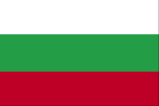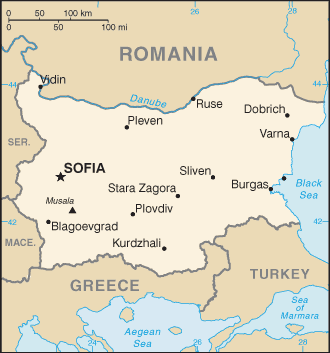|
Bulgaria
|

|
Capital: Sofia
Population: 7,000,119
Brief History of Bulgaria:
Bulgaria gets its name from the Bulgar people who settled in the area around 200 AD. In the very early days of the land that is today Bulgaria, the area was settled by the culture of Ancient Thrace.
In the 600's the first Bulgarian state was formed. Later the First Bulgarian Kingdom would take over under the leader Tsar Simeon I from 893 to 927. This time is often called the Golden Age of Bulgaria. It was a time of prosperity, art, culture, education, and literature. However, this time did not last for too long as neighboring countries and empires would have an impact on Bulgaria for the next 1000 years.
First came the Byzantine Empire in 1018. Although, the Bulgarians would push back the Byzantines the Mongols would soon arrive, followed by the Ottoman Empire. The Ottoman Empire would rule for over 500 years. They would not break free of the Ottomans until the early 1900s.
Next would follow many wars including the Balkan Wars, WWI, and WWII. After WWII Bulgaria became a communist nation and a satellite of the Soviet Union. With the fall of the Soviet Union in the late 1900s, Bulgaria experienced economic struggles and social unrest. On January 1, 2007 Bulgaria became a member of the European Union.
The Geography of Bulgaria
Total Size: 110,910 square km
Size Comparison: slightly larger than Tennessee
Geographical Coordinates: 43 00 N, 25 00 E
World Region or Continent: Europe
General Terrain: mostly mountains with lowlands in north and southeast
Geographical Low Point: Black Sea 0 m
Geographical High Point: Musala 2,925 m
Climate: temperate; cold, damp winters; hot, dry summers
Major cities: SOFIA (capital) 1.192 million (2009), Plovdiv, Varna, Burgas
The People of Bulgaria
Type of Government: parliamentary democracy
Languages Spoken: Bulgarian 84.5%, Turkish 9.6%, Roma 4.1%, other and unspecified 1.8% (2001 census)
Independence: 3 March 1878 (as an autonomous principality within the Ottoman Empire); 22 September 1908 (complete independence from the Ottoman Empire)
National Holiday: Liberation Day, 3 March (1878)
Nationality: Bulgarian(s)
Religions: Bulgarian Orthodox 82.6%, Muslim 12.2%, other Christian 1.2%, other 4% (2001 census)
National Symbol: lion
National Anthem or Song: Mila Rodino (Dear Homeland)
Economy of Bulgaria
Major Industries: electricity, gas, water; food, beverages, tobacco; machinery and equipment, base metals, chemical products, coke, refined petroleum, nuclear fuel
Agricultural Products: vegetables, fruits, tobacco, wine, wheat, barley, sunflowers, sugar beets; livestock
Natural Resources: bauxite, copper, lead, zinc, coal, timber, arable land
Major Exports: clothing, footwear, iron and steel, machinery and equipment, fuels
Major Imports: machinery and equipment; metals and ores; chemicals and plastics; fuels, minerals, and raw materials
Currency: lev (BGL)
National GDP: $101,000,000,000
** Source for population (2012 est.) and GDP (2011 est.) is CIA World Factbook.
Back to Geography Home Page
